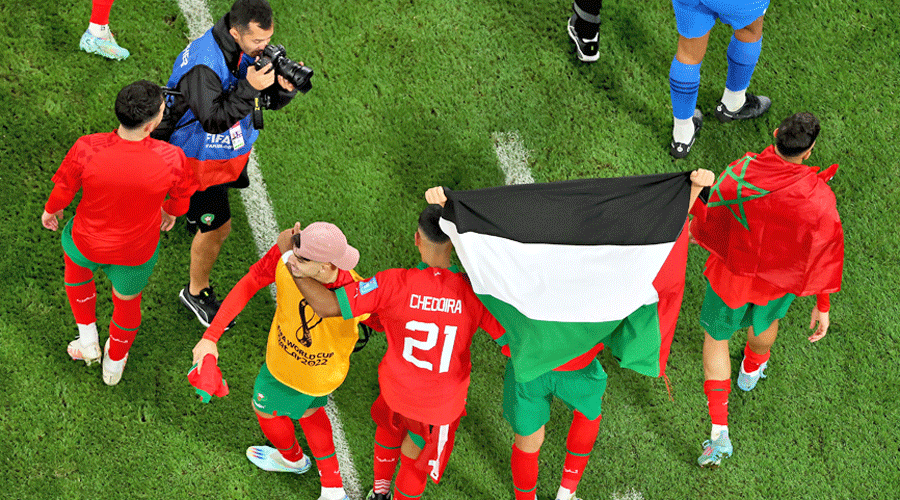In the tumult, in those minutes of unrestrained joy after Morocco became the first Arab team to reach the quarter-finals of the World Cup, the players took a moment to come together after their famous victory and huddle for a photograph to capture the moment.
Together on the turf where they had laboured for more than two hours to outlast Spain, cheering and smiling and with the throng of red-clad Moroccan fans roaring behind them, the players and their coaches pressed together and waited as a flag was unfurled.
It wasn’t Morocco’s flag.
Stretched out so it could be displayed in all its glory, was the Palestinian banner. Morocco, the best Arab team at the first Arab World Cup, had set off celebrations across North Africa and beyond with its win.
“Palestine is the 33rd country in the World Cup,” said Abdullah Mansouri, a Moroccan fan trying to make himself heard above the horns and drums that accompanied his country’s win. “Palestine is our cause, our struggle in the Arab world, in all the Arab world.”
One of the features of the first World Cup to be played in the Muslim world has been the ubiquitous presence of the red, white, green and black colors of a team that is a member of Fifa but whose homeland is not a full member of the United Nations.
The tournament has offered a rare moment of Arab solidarity, with fans from different countries cheering on one another’s teams — and expressing support for the Palestinian cause — even as some Arab governments, including Morocco’s, have recently normalized relations with Israel.
That kind of normalization is not mirrored on the Arab street, as it is known, revealing a disconnect with the Arab leadership, and a sense that the Palestinian cause still resonates widely with people across the Arab world and the Arab diaspora.
On the ground and in the stadiums in Qatar, for example, Palestinian flags, Palestinian armbands and even black and white headdresses, or kaffiyehs, featuring the Palestinian flag have all been on display throughout the month-long tournament.
“To see Palestinians cheering for Morocco and Moroccans cheering for Palestine is one of the most significant Arab popular rejections of normalization with Israel,” the Palestinian journalist and editor Ramzy Baroud told Days of Palestine. “This moment will live in the minds of several generations of Arabs forever.”
On Tuesday, thousands of fans arrived at Morocco’sgame dressed with similar emblems of support, something the hosts have done little to stop. In the V.I.P. seats, and even the V.V.I.P. seats, guests have paired their traditional crisp white thobes with armbands in small black-and-white checks, an approximation of the Palestinian kaffiyeh after Germany’s interior minister attended her country’s opening game wearing a rainbow-colored armband.
The fans, and their flags, were back on Saturday, when Morocco faced and defeated Portugal in the quarter-finals.
New York Times News Service











